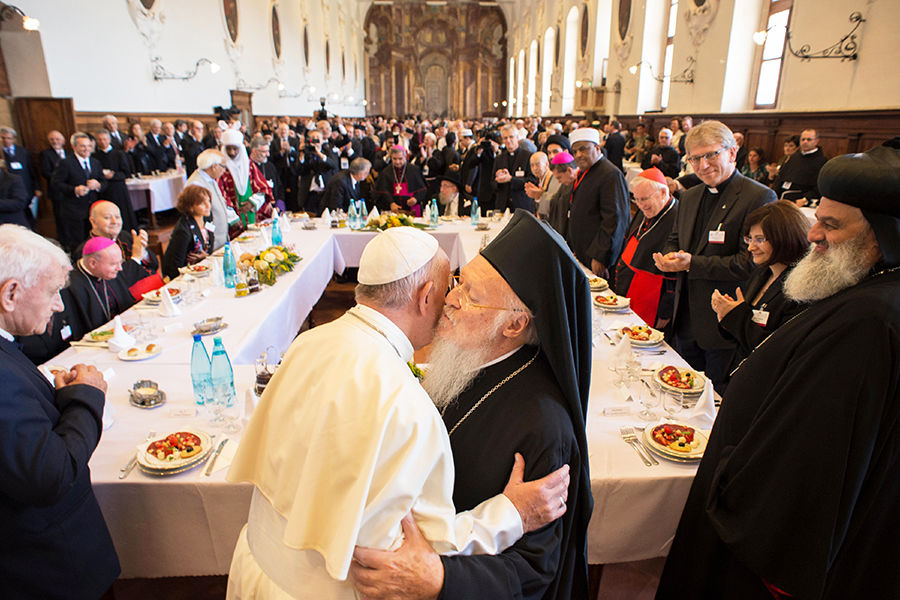Assisi, Italy, Sep 20, 2016 / 10:38 am (CNA/EWTN News).- In efforts for peace, indifference is the greatest sickness of our time, Pope Francis said at an interreligious summit in Assisi on Tuesday.
“It is a virus that paralyzes, rendering us lethargic and insensitive, a disease that eats away at the very heart of religious fervor, giving rise to a new and deeply sad paganism: the paganism of indifference.” “We cannot remain indifferent,” he said. “Today the world has a profound thirst for peace.”
The Pope spoke Sept. 20 during an international interreligious gathering marking the 30th anniversary of the World Day of Prayer for Peace convoked by St. John Paul II in 1986. The event, held in different locations, has been organized every year by the Sant'Egidio community.
The last day of prayer led by a Pope, however, was held by Benedict XVI in 2011, to commemorate the 25th anniversary of the first historic meeting in Assisi. At this year's gathering in Assisi, Pope Francis focused on humanity's thirst for peace and the toxic nature of self-interest and apathy in the face of violence around the world.
“Prayer and the desire to work together are directed towards a true peace that is not illusory: not the calm of one who avoids difficulties and turns away, if his personal interests are not at risk,” he said. Peace “is not the cynicism of one who washes his hands of any problem that is not his,” Francis continued. “It is not the virtual approach of one who judges everything and everyone using a computer keyboard, without opening his eyes to the needs of his brothers and sisters.”
Above all, peace is a gift of God, Pope Francis said, explaining that it is only with his help that our works can bear fruit. He acknowledged the distances many people traveled to be at the summit in Assisi, but stressed that working together for peace is not merely a physical movement, but most of all a spiritual movement — a spiritual response — of becoming more open to God and to our fellow brothers and sisters.
“In Lesbos, my dear brother, the Ecumenical Patriarch Bartholomew, and I saw the sorrow of war in the eyes of the refugees, the anguish of peoples thirsting for peace.” “I am thinking of the families, whose lives have been shattered; of the children who have known only violence in their lives; of the elderly, forced to leave their homeland.”
Francis also spoke out against war and arms trading, which he said are the reason for much of the poverty around the world. “We do not want these tragedies to be forgotten. Rather together we want to give voice to all those who suffer, to all those who have no voice and are not heard. They know well, often better than the powerful, that there is no tomorrow in war, and that the violence of weapons destroys the joy of life.”
Speaking out against religious fundamentalism, the Pope said, “peace alone, and not war, is holy!” “We never tire of repeating that the name of God cannot be used to justify violence,” he said. “Peace, a thread of hope that unites earth to heaven, a word so simple and difficult at the same time.”
Peace means forgiveness, openness to dialogue, cooperation, and education, Pope Francis said, noting how leaders from all branches of Christianity were in attendance, all united in their prayer for peace. “Prayer and concrete acts of cooperation help us to break free from the logic of conflict and to reject the rebellious attitudes of those who know only how to protest and be angry,” he said.
Our path toward peace “leads us to immersing ourselves in situations and giving first place to those who suffer,” the Pope stated. “To taking on conflicts and healing them from within; to following ways of goodness with consistency, rejecting the shortcuts offered by evil; to patiently engaging processes of peace, in good will and with God’s help.”

